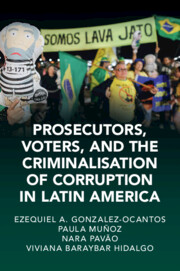Book contents
- Prosecutors, Voters, and the Criminalisation of Corruption in Latin America
- Cambridge Studies in Law and Society
- Prosecutors, Voters, and the Criminalisation of Corruption in Latin America
- Copyright page
- Contents
- Figures
- Tables
- Acknowledgements
- 1 Introduction
- Part I Causes
- Part II Public Reactions
- 5 Fighting Corruption, Curbing Cynicism?
- 6 Of Cockroaches and Superheroes
- 7 Is Prosecutorial Zeal What Partisans Make of It?
- 8 Prosecutorial Trade-Offs and the Precarity of Hope
- Part III Conclusions
- Bibliography
- Index
- Cambridge Studies in Law and Society
8 - Prosecutorial Trade-Offs and the Precarity of Hope
Survey Evidence from Peru
from Part II - Public Reactions
Published online by Cambridge University Press: 05 April 2023
- Prosecutors, Voters, and the Criminalisation of Corruption in Latin America
- Cambridge Studies in Law and Society
- Prosecutors, Voters, and the Criminalisation of Corruption in Latin America
- Copyright page
- Contents
- Figures
- Tables
- Acknowledgements
- 1 Introduction
- Part I Causes
- Part II Public Reactions
- 5 Fighting Corruption, Curbing Cynicism?
- 6 Of Cockroaches and Superheroes
- 7 Is Prosecutorial Zeal What Partisans Make of It?
- 8 Prosecutorial Trade-Offs and the Precarity of Hope
- Part III Conclusions
- Bibliography
- Index
- Cambridge Studies in Law and Society
Summary
The chapter finds that satisfaction with the investigation in Peru correlates with positive emotions and optimistic prognoses about the future. Different emotional reactions are further associated with voters’ varying propensities to tolerate corruption: positive emotions are linked to severity and negative ones to cynicism. A conjoint experiment shows that the taskforce indeed induces voters to impose greater penalties on politicians than other sources of corruption allegations. The chapter leverages another conjoint to document how voters respond to trade-offs at the heart of prosecutorial efforts, and thus better understand why such investigative choices eventually complicate citizens’ relationship with crusades. The conjoint reveals that Peruvians are reluctant to endorse leniency agreements at the heart of the investigative strategy. Together with additional descriptive survey statistics measuring reactions to other controversies triggered by Lava Jato, the experimental results underscore how hard it is for prosecutors to cement hope in anti-corruption.
Keywords
- Type
- Chapter
- Information
- Prosecutors, Voters, and the Criminalization of Corruption in Latin AmericaThe Case of Lava Jato, pp. 237 - 258Publisher: Cambridge University PressPrint publication year: 2023

